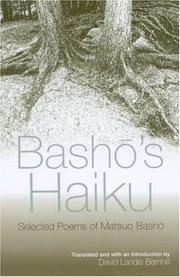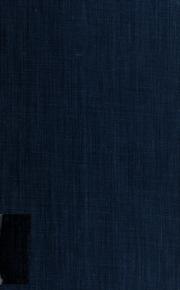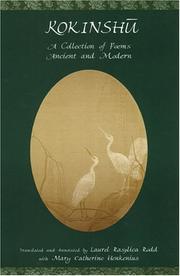| Listing 1 - 10 of 17 | << page >> |
Sort by
|

ISBN: 0791484653 1423740017 9781423740018 9780791461655 0791461653 9780791461662 0791461661 9780791484654 Year: 2004 Publisher: Albany State University of New York Press
Abstract | Keywords | Export | Availability | Bookmark
 Loading...
Loading...Choose an application
- Reference Manager
- EndNote
- RefWorks (Direct export to RefWorks)
2005 CHOICE Outstanding Academic TitleBasho's Haiku offers the most comprehensive translation yet of the poetry of Japanese writer Matsuo Bashō (1644–1694), who is credited with perfecting and popularizing the haiku form of poetry. One of the most widely read Japanese writers, both within his own country and worldwide, Bashō is especially beloved by those who appreciate nature and those who practice Zen Buddhism. Born into the samurai class, Bashō rejected that world after the death of his master and became a wandering poet and teacher. During his travels across Japan, he became a lay Zen monk and studied history and classical poetry. His poems contained a mystical quality and expressed universal themes through simple images from the natural world.David Landis Barnhill's brilliant book strives for literal translations of Bashō's work, arranged chronologically in order to show Bashō's development as a writer. Avoiding wordy and explanatory translations, Barnhill captures the brevity and vitality of the original Japanese, letting the images suggest the depth of meaning involved. Barnhill also presents an overview of haiku poetry and analyzes the significance of nature in this literary form, while suggesting the importance of Bashō to contemporary American literature and environmental thought.
Japanese poetry --- Haiku --- Japanese poetry (Collections) --- Japanese literature --- Translations into English.
Book
ISBN: 1283265680 9786613265685 9004212795 9789004212794 9781906876203 1906876207 Year: 2011 Publisher: Folkestone, Kent, U.K. : Global Oriental,
Abstract | Keywords | Export | Availability | Bookmark
 Loading...
Loading...Choose an application
- Reference Manager
- EndNote
- RefWorks (Direct export to RefWorks)
This is the second volume to be published in the 20-volume set. It includes 114 poems (104 tanka , ten choka ), traditionally considered to be the zoka genre, although some of them can be classified as benka , since they deal with death and sorrow. It also contains two poems in Chinese. The volume has several long introductions (all written in Chinese) to the poems that follow. All the poems in this volume were composed between AD 724 and 733, which represents a much greater homogeneity in comparison to books one to four. Most of the poems were written by Yamanoue-no Okura (AD660-733), one of the greatest Man’yōshū poets, who was possibly a Korean from Kudara (Paekche), or at least a descendant of Kudara immigrants to Japan. The spelling system in this volume is predominantly phonographic, with only a few exceptions. In addition, the spelling system appears to reflect Early Western Old Japanese, as demonstrated by Bentley (1997, 2002). The same can be said about its overall grammatical features.
Waka --- Japanese poetry --- Japanese poetry (Collections) --- Japanese literature --- Man'yōsh --- Criticism and interpretation.

ISBN: 0295957980 0385140304 9780295957982 Year: 1981 Publisher: Garden City Anchor
Abstract | Keywords | Export | Availability | Bookmark
 Loading...
Loading...Choose an application
- Reference Manager
- EndNote
- RefWorks (Direct export to RefWorks)
Japanese poetry --- Translations into English --- Translations into English. --- J5700 --- -Japan: Literature -- poetry in general --- -Japanese poetry (Collections) --- Japanese literature --- Japan: Literature -- poetry in general --- -Japanese literature --- Japanese poetry (Collections) --- Japanese poetry - Translations into English --- -Translations into English
Book
Abstract | Keywords | Export | Availability | Bookmark
 Loading...
Loading...Choose an application
- Reference Manager
- EndNote
- RefWorks (Direct export to RefWorks)
J5730 --- Japan: Literature -- poetry -- haiku, haikai --- Haikai --- Japanese poetry --- Japanese poetry (Collections) --- Japanese literature --- Haiku --- Renga --- History and criticism
Book
ISBN: 1280995750 9786613767363 900423151X 9789004231511 9004219315 9789004219311 9789004219311 9781280995750 6613767360 Year: 2012 Publisher: Leiden BRILL
Abstract | Keywords | Export | Availability | Bookmark
 Loading...
Loading...Choose an application
- Reference Manager
- EndNote
- RefWorks (Direct export to RefWorks)
In Optical Allusions: Screens, Paintings, and Poetry in Classical Japan (ca. 800-1200) , Joseph T. Sorensen illustrates how, on both the theoretical and the practical level, painted screens and other visual art objects helped define some of the essential characteristics of Japanese court poetry. In his examination of the important genre later termed screen poetry, Sorensen employs ekphrasis (the literary description of a visual art object) as a framework to analyze poems composed on or for painted screens. He provides close readings of poems and their social, political, and cultural contexts to argue the importance of the visual arts in the formation of Japanese poetics and poetic conventions.
Japanese poetry --- Literature in art. --- Screen painting, Japanese --- Japanese screen painting --- Japanese poetry (Collections) --- Japanese literature --- History and criticism. --- History.
Book
ISBN: 4002401014 Year: 1995 Publisher: 東京 岩波書店
Abstract | Keywords | Export | Availability | Bookmark
 Loading...
Loading...Choose an application
- Reference Manager
- EndNote
- RefWorks (Direct export to RefWorks)
J5710 --- J5506 --- Japan: Literature -- poetry -- Waka, tanka, chōka --- Japan: Literature -- reference works --- Japanese poetry --- Waka --- Japanese poetry (Collections) --- Japanese literature --- Hachidaishū

ISBN: 0887272495 Year: 1996 Publisher: Boston Cheng and Tsui
Abstract | Keywords | Export | Availability | Bookmark
 Loading...
Loading...Choose an application
- Reference Manager
- EndNote
- RefWorks (Direct export to RefWorks)
J5710 --- Japan: Literature -- poetry -- Waka, tanka, chōka --- Waka --- Japanese poetry --- Japanese poetry (Collections) --- Japanese literature --- Translations into English --- Translations into English.
Book
ISBN: 0231542437 9780231542432 0231179901 9780231179904 023117991X 9780231179911 9780231179904 9780231179911 Year: 2016 Publisher: New York
Abstract | Keywords | Export | Availability | Bookmark
 Loading...
Loading...Choose an application
- Reference Manager
- EndNote
- RefWorks (Direct export to RefWorks)
For Nirvana features exceptional examples of the poet Cho Oh-Hyun's award-winning work. Cho Oh-Hyun was born in Miryang, South Gyeongsang Province, Korea, and has lived in retreat in the mountains since becoming a novice monk at the age of seven. Writing under the Buddhist name Musan, he has composed hundreds of poems in seclusion, many in the sijo style, a relatively fixed syllabic poetic form similar to Japanese haiku and tanka. For Nirvana contains 108 Zen sijo poems (108 representing the number of klesas, or "defilements," that one must overcome to attain enlightenment). These transfixing works play with traditional religious and metaphysical themes and include a number of "story" sijo, a longer, more personal style that is one of Cho Oh-Hyun's major innovations. Kwon Youngmin, a leading scholar of sijo, provides a contextualizing introduction, and in his afterword, Heinz Insu Fenkl reflects on the unique challenges of translating the collection.
Japanese poetry. --- POETRY / Asian / General. --- Japanese poetry (Collections) --- Japanese literature --- Cho, Pyŏng-hwa, --- Cho, Byung-Hwa, --- Cho, Byunghwa, --- Cho, Byung-Wha, --- Cho, P'yŏnun, --- Cho, Byoung Hwa, --- 趙炳華, --- 趙 炳華, --- 조 병화, --- 조병화,
Book
ISBN: 9023217292 9026495129 Year: 1980 Volume: vol *22 Publisher: Assen Van Gorcum/Uitgeverij Orion
Abstract | Keywords | Export | Availability | Bookmark
 Loading...
Loading...Choose an application
- Reference Manager
- EndNote
- RefWorks (Direct export to RefWorks)
Poetry --- Japanese language --- Asian literature --- Letterkunde, Japanse --- Littérature japonaise --- Japanese poetry --- History and criticism. --- J5700 --- J5730 --- J5710 --- J5740 --- -Japanese poetry (Collections) --- Japanese literature --- Japan: Literature -- poetry in general --- Japan: Literature -- poetry -- haiku, haikai --- Japan: Literature -- poetry -- Waka, tanka, chōka --- Japan: Literature -- poetry -- haiku -- senryū, kyōka (comic haiku and tanka) --- History and criticism --- -Japan: Literature -- poetry in general --- -Academic Collection --- Japanese poetry (Collections) --- -Academic collection --- Academic collection
Book
ISBN: 9789004345768 9781906876203 9789004233591 9781906876036 9789004284968 9789004322523 9789004261983 9789004431850 9789004315594 9789004243002 9004243003 9004233598 9789004284975 9004284974 9004284966 9004346708 9789004346703 9004345760 1906876207 1906876037 9004322523 9004315594 9004261982 9004370102 9004261990 9789004433335 9789004370104 9789004261990 Year: 2017 Publisher: Leiden, Netherlands : Koninklijke Brill NV,
Abstract | Keywords | Export | Availability | Bookmark
 Loading...
Loading...Choose an application
- Reference Manager
- EndNote
- RefWorks (Direct export to RefWorks)
Book twenty (20.4293-4516) of the Man'yo¯shu¯ comprises 224 poems (218 tanka , six cho¯ka ) with unspecified genres. From the social point of view this book is the most varied one, as it includes poems from empresses and princes, various strata of the nobility, down to the lowest border guard soldiers. Organized chronologically, book twenty is important for two important reasons. First, it contains many poems written in Eastern Old Japanese. Second, given the fact that many authors of the poems written in Western Old Japanese are well known historical and political figures of the mid-eighth century, it provides an interesting literary background to political struggles that were taking place at this time at the Nara court. Following book twenty the publication sequence will be as follows: book seventeen, book eighteen, book nineteen, book one, book nine, and then starting from book two in numerical order. A full rationale for the publication sequence can be found in book fifteen. Each volume of this new translation contains the original text, kana transliteration, romanization, glossing and commentary.
J5715 --- Man'yoshu --- -Japanese poetry --- -Japanese literature --- Japanese poetry (Collections) --- Japan: Literature -- poetry -- Waka, tanka, chōka -- Man'yōshū --- Criticism and interpretation --- Translations into English --- -Japanese poetry (Collections) --- Japanese literature --- Japanese poetry --- Man'yōshū --- Man'yôsyû --- Man̄yefushifu --- Manʺësi︠u︡ --- Mannyōshū --- Manyŏpchip --- Wan yeh chi --- Nishi Honganji-bon Man'yōshū --- Man.yôshû --- Criticism and interpretation. --- Japanese poetry. --- Man'yōshū. --- To 794 --- Man.yôsh --- Nishi Honganji-bon Man'yōsh --- Mannyōsh --- Manʺësi͡ --- Man'yôsy --- -Criticism and interpretation --- Translations. --- Translations into English.
| Listing 1 - 10 of 17 | << page >> |
Sort by
|

 Search
Search Feedback
Feedback About UniCat
About UniCat  Help
Help News
News